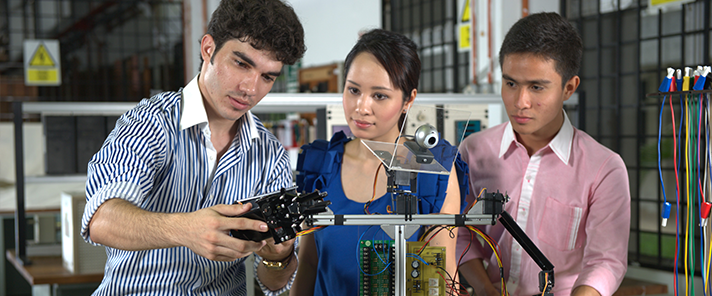Bachelor of Mechanical Engineering with Honours
Bachelor of Mechanical Engineering with Honours
(R2/521/6/0032)(05/29)(MQA/FA 1583)
Intakes: March, June/July & Sept/Oct
Mode of Study: Full Time
Duration: 4 years
Credits: 135


50% Tuition Fee waiver available for Malaysian & International students
Kickstart your course with just RM100
IUKL offers scholarships to deserving high performing Malaysian students
Home » Programmes » Engineering and Technology » Bachelor of Mechanical Engineering with Honours
Intakes: March, June/July & Sept/Oct
Mode of Study: Full Time
Duration: 4 years
Credits: 135
Mechanical engineering deals with anything that moves including the human body.
Mechanical engineers learn about materials, statics and dynamics, solid and fluid mechanics, thermodynamics, control engineering, industrial engineering, instrumentation and design. It also covers designing and manufacturing everything from small individual parts to large systems such as airplanes and spacecraft.
Mechanical engineering is perhaps the broadest and most diverse engineering discipline as it will require you to learn skills for everything that is made.
If you have these characteristics, then this programme may suit you.
This programe involves the principles of engineering such as statics, materials science, design and analysis of mechanical parts and systems.
This field also requires an understanding of core areas including mechanics, dynamics, thermodynamics, fluid mechanics, structural analysis, electrical and electronic system.
Mechanical engineers use these core principles along with tools like computer-aided design, and product lifecycle management to design and analyse manufacturing plants, industrial equipment and machinery, heating and cooling systems, transportation systems, aircraft, watercraft, robotics, medical devices and others.
Solid foundation in mathematics, physics and chemistry is required for a student to acquire knowledge and skills effectively in his/her learning process in this programme.
Graduates of this programme will be capable of performing engineering tasks in the manufacturing or production sectors, power generation, oil and gas sectors, transportation (road, train, naval, aircraft), building services and construction industries.
PEO 1 : Graduates with adequate knowledge and competency in various fields of mechanical engineering.
PEO 2 : Graduates with professional attributes, and are adaptable to the global work environment.
| PLO | DESCRIPTIONS |
|---|---|
| PLO 1 | Engineering Knowledge - Apply knowledge of mathematics, natural science, computing and engineering fundamentals, and an engineering specialization as specified in WK1 to WK4 respectively to develop solutions to complex engineering problems |
| PLO 2 | Problem Analysis - Identify, formulate, research literature and analyze complex engineering problems reaching substantiated conclusions using first principles of mathematics, natural sciences and engineering sciences with holistic considerations for sustainable development (WK1 to WK4) |
| PLO 3 | Design/Development of Solutions - Design creative solutions for complex engineering problems and design systems, components or processes to meet identified needs with appropriate consideration for public health and safety, whole-life cost, net zero carbon as well as resource, cultural, societal, and environmental considerations as required (WK5) |
| PLO 4 | Investigation - Conduct investigation of complex engineering problems using research methods including research-based knowledge, including design of experiments, analysis and interpretation of data, and synthesis of information to provide valid conclusions (WK8); |
| PLO 5 | Tool Usage - Create, select and apply, and recognize limitation of appropriate techniques, resources, and modern engineering and IT tools, including prediction and modelling, to complex engineering problems, (WK2 and WK6); |
| PLO 6 | The Engineer and the World - Analyze and evaluate sustainable development impacts to: society, the economy, sustainability, health and safety, legal frameworks, and the environment, in solving complex engineering problems (WK1, WK5, and WK7) |
| PLO 7 | Ethics - Apply ethical principles and commit to professional ethics and norms of engineering practice and adhere to relevant national and international laws. Demonstrate an understanding of the need for diversity and inclusion (WK9); |
| PLO 8 | Individual and Collaborative Team Work - Function effectively as an individual, and as a member or leader in diverse and inclusive teams and in multidisciplinary, face-to-face, remote and distributed settings (WK9); |
| PLO 9 | Communication - Communicate effectively and inclusively on complex engineering activities with the engineering community and with society at large, such as being able to comprehend and write effective reports and design documentation, make effective presentations, taking into account cultural, language, and learning differences; |
| PLO 10 | Project Management and Finance - Apply knowledge and understanding of engineering management principles and economic decision-making and apply these to one’s own work, as a member and leader in a team, and to manage projects in multidisciplinary environments; |
| PLO 11 | Life Long Learning - Recognise the need for, and have the preparation and ability for i) independent and life-long learning ii) adaptability to new and emerging technologies and iii) critical thinking in the broadest context of technological change (WK8). |
| STPM | Minimum 2 Principal Passes (including Mathematics and Physics/Chemistry) |
| A-Level | Minimum 2 Principal Passes (D) (including Mathematics and Physics/Chemistry) |
| UEC | Minimum 5 Bs (including Mathematics and Physics/Chemistry) |
| Diploma / HND | Minimum CGPA of 2.00 and Band 2 MUET |
| Foundation/Matriculation | Minimum CGPA of 2.00 and Band 2 MUET |
| SAM/HSC/AUSMAT | TER/UAI: Average of 60% or higher in 5 subjects (including Mathematics and Physics/Chemistry) |
| CPU/CIMP | Minimum of 60% or higher in 6 subjects (including Mathematics and Physics/Chemistry) |
| IB | Minimum 26/42 points or higher based on 6 subjects including 4/7 in Mathematics and Physics/Chemistry |
| DVM | Minimum CGPA of 2.50 (Required to take Remedial Courses during the first semester) |
| Other Qualifications | As recognised by the Senate of IUKL as equivalent to STPM |
| ENGLISH LANGUAGE REQUIREMENT | |
|---|---|
| IELTS | 5 |
| TOEFL (PBT) | 500 |
| TOEFL (IBT) | 42 |
| PTE | 47 |
| MUET | BAND 3 |
| Cambridge English | 154 |
Co-Curriculum I*, Engineering Drawing I, Engineering Math I, Engineering Workshop, Interactive Skills, Introduction to Engineering Experimentation, Introduction To Mech. Engineering, Material Science, Office Application Technology, Statics, Technical & Professional Communication
Dynamics, Electrical Technology (Power & Machines), Engineering Drawing II (Computer Aided), Engineering Experimentation I, Engineering Materials, Engineering Math II, Fluid Mechanics I, Introduction to Design, Numerical Methods, Solid Mechanics I, Thermodynamics I
Component Design, Computer Programming, Control Engineering, Engineering Electronics & Microprocessors, Fluid Mechanics II, Industrial Engineering, Manufacturing Processes, Measurements & Instrumentation, Mechanics Of Machines & Vibration, Solid Mechanics II, Thermodynamics II, Engineering Experimentation II, Industrial Training
Elective I**, Elective II**, Elective III**, Engineering Management, Safety & Economics, Engineers & Society, Entrepreneurship for Engineers, Finite Elements, System Design, Thesis Project I, Thesis Project II
Final Year Elective Subjects to be Offered:
Refrigeration & Air-Conditioning / Vibration & Vibration Measurements / Acoustics & Noise - Control & Measurements / Material Processing / Material Selection / NanoMaterials / Production Planning & Control / Robotics
This programme is accredited by the Engineering Accreditation Council (EAC) and recognized by the Malaysian Government. EAC is a delegated body by the Board of Engineers Malaysia (BEM) as the only recognized accrediting body for engineering degree programmes offered in Malaysia.
This degree is also internationally recognised under the Washington Accord, a multi-national agreement which recognises the substantial equivalency of engineering degree programmes accredited by the responsible bodies in each of the current signatory countries.
** Provisional Signatories are recognised as having appropriate systems and processes in place to develop towards becoming a Full Signatory.
Recognition under the Washington Accord allows graduates to be recognised worldwide for career opportunities or for further education progression.
After graduation, an engineer needs to register with the Board of Engineers Malaysia to be a graduate engineer. After a few years of practical experience (supervised by a professional engineer), the graduate engineer can apply to sit for Professional Interview (with IEM). If he/she passes the Interview, he/she can apply to BEM to be a Professional Engineer that entitles him/her to use the title Ir.
The Board of Engineers Malaysia (BEM) is a federal statutory agency under the Ministry of Works Malaysia established under the Registration of Engineers Act 1967 (REA 1967). Amongst its primary roles are to register Graduate Engineer (GE), Engineering Technologist (ET), and Inspector of Works (IoW) and to regulate the professional conduct and practice of registered Persons to safeguard the safety, health and interest of the public.
The links of BEM circulars related to mandatory registration with BEM and promotional webinars/videos of BEM are as follows:
| NO. | SITE | LINK |
|---|---|---|
| 1. | BEM Official Website | http://bem.org.my/ |
| 2. | Mandatory Registration with the Board of Engineers Malaysia | http://bem.org.my/documents/20181/33485/Mandatory+registration+with+BEM.pdf/80098f0a-4fba-4f58-a980-a783cc1a2366 |
| 3. | BEM Mini Convention Presentation Material | http://bem.org.my/web/guest/bem-mini-convention |
| 4. | BEM Webinar Presentation Material | http://bem.org.my/web/guest/bem-webinar-presentation-material |
| 5. | BEM Official Youtube Channel |
Once you graduate, you can register yourselves with the Board of Engineers Malaysia to recognise you as a graduate engineer.
Mechanical engineering graduates are sought by employers in almost all sectors of the engineering industry:
A Mechanical Engineer graduate in professional jobs receives an average of RM 30K to RM 40K a year, rising to between RM50K and RM70K after 10 years in the job.
